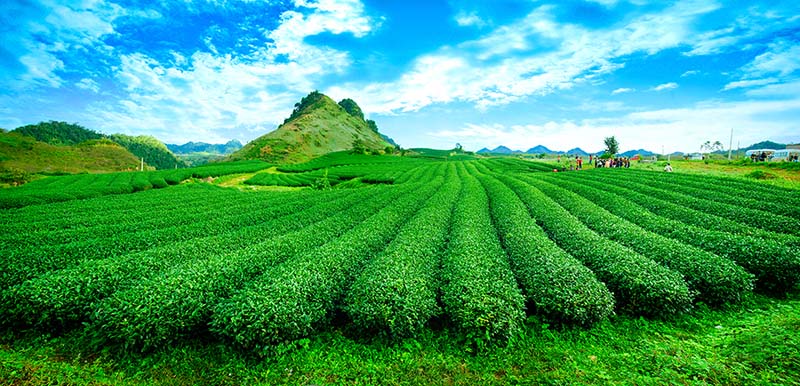State policies on crop production activities in Vietnam
What are the State policies on crop production activities in Vietnam? What are the principles of crop production activities in Vietnam? – Phuong Thanh (Nghe An)

State policies on crop production activities in Vietnam (Internet image)
Regarding this issue, LawNet would like to answer as follows:
1. State policies on crop production activities in Vietnam
- The State shall invest in the following activities:
+ Enumerating, investigating and building databases of crop production activities; databases of market information and forecasting; developing strategies for crop production development; establishing technical standards and regulations on crop farming activities;
+ Building and improving infrastructure facilities and equipment of state-owned science and technology bodies specialized in conducting policy and fundamental researches in the crop production sector;
+ Science and technology activities referred to in point a and b of clause 2 of Article 6 herein;
+ Training agricultural extension personnel working in areas facing difficult or extremely socio-economic conditions.
- In each period and within the capacity of the state budget, the State shall support the following activities:
+ Production connection, development of concentrated commodity production areas and organic crop production zones; shift in the crop structure; farming on the sloping land, lowland, alkaline soil, saline soil, sandy soil at or near the coast, soil at risk of desertification or degradation; development of material areas serving the needs of processing plants; management of planting zones and commodity origin tracking;
+ Science and technology activities referred to in point c of clause 2 of Article 6 herein;
+ Application of advanced quality control systems and crop product certification;
+ Construction of infrastructure, analysis and evaluation of primary crop production conditions, agro-chemical and soil evaluation for the concentrated commodity production; building of infrastructure facilities intended for crop produce preservation, storage and processing; production of organic fertilizers, biological products; organic farming; mechanization; national laboratories and international inter-laboratory testing;
+ Planned rice production;
+ Production of super prototypal varieties, prototypal varieties and parental varieties for production of F1 hybrid seeds, new original and commercial varieties; revitalization of specialty varieties and indigenous crop varieties; preservation of first-generation plants; protection and development of first-generation plant gardens; import of new varieties, disposition of plant variety property rights;
+ Construction of wholesale markets in crop products; branding, trade promotions, development of markets for consumption of crop products;
+ Restoration of crop production in case of natural disasters or epidemics that may occur;
+ Workforce training; transfer of technological breakthroughs and advances in agricultural extension in the crop production industry.
- The State shall encourage organizations and individuals to invest in activities specified in clauses 1 and 2 of this Article and the following activities:
+ Cooperation and affiliation in research and development, business, supply of engineering services, technology transfer and related activities in the crop production sector;
+ Private sector investment in public services in the crop production industry; improvement of the capacity for performing conformity assessment activities;
+ Crop insurance;
+ Organic farming, farming associated with ecotourism, landscape protection, culture and history at rural areas;
+ Use of organic fertilizers.
(Article 4 of the Law on Crop Production 2018)
2. Principles of crop production activities in Vietnam
- Develop crop production according to the value chain, connect it with market orientations, correspond to crop production development strategies, planning and proposals for use of land and other resources; create favorable conditions for the development of cooperation and cooperation in production and the establishment of areas for the concentrated commodity production, contract-based production and production obtaining quality certification; maintain food security; balance the interests of the State and those of organizations and individuals.
- Make effective, economical and sustainable use of natural resources and infrastructure facilities; use agricultural supplies in a safe and efficient manner.
- Comply with technical standards and regulations on land and water environmental quality and production processes; ensure food safety, biosafety, epidemic safety and environmental protection.
- Promote regional advantages, connect crop production activities with the conservation of specialty and indigenous cultivated crop varieties; protect sustainable crop cultivation systems, agricultural heritage, landscape and culture associated with eco-tourism and new rural development.
- Proactively forecast, prevent and control natural disasters and harmful organisms; make adaptations to climate change.
- Meet international integration requirements; comply with treaties to which the Socialist Republic of Vietnam is a contracting party.
(Article 3 of the Law on Crop Production 2018)
- Key word:
- crop production activities
- in Vietnam
- Vietnam
- Cases of land rent exemption and reduction under the latest regulations in Vietnam
- Economic infrastructure and social infrastructure system in Thu Duc City, Ho Chi Minh City
- Regulations on ordination with foreign elements in religious organizations in Vietnam
- Increase land compensation prices in Vietnam from January 1, 2026
- Determination of land compensation levels for damage during land requisition process in Vietnam
- Who is permitted to purchase social housing according to latest regulations in Vietnam?
-

- Number of deputy directors of departments in Vietnam ...
- 15:04, 05/03/2025
-

- Cases ineligible for pardon in Vietnam in 2025
- 14:43, 05/03/2025
-

- Decree 50/2025 amending Decree 151/2017 on the ...
- 12:00, 05/03/2025
-

- Circular 07/2025 amending Circular 02/2022 on ...
- 11:30, 05/03/2025
-

- Adjustment to the organizational structure of ...
- 10:34, 05/03/2025
-

- Notable new policies of Vietnam effective as of ...
- 16:26, 11/04/2025
-
.Medium.png)
- Notable documents of Vietnam in the previous week ...
- 16:21, 11/04/2025
-
.Medium.png)
- Notable documents of Vietnam in the previous week ...
- 16:11, 02/04/2025
-
.Medium.png)
- Notable new policies of Vietnam to be effective ...
- 16:04, 02/04/2025
-
.Medium.png)
- Notable new policies of Vietnam effective from ...
- 14:51, 21/03/2025

 Article table of contents
Article table of contents
